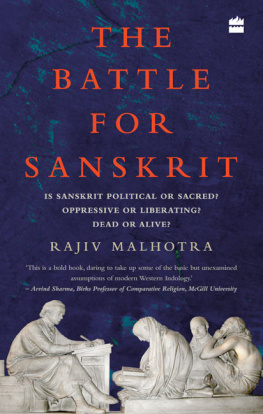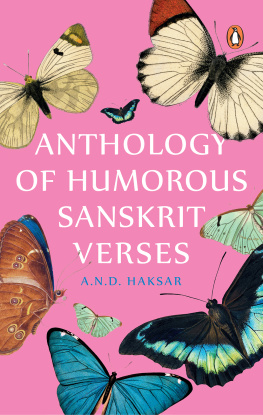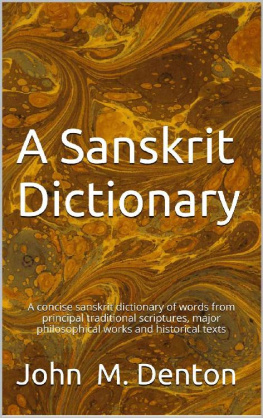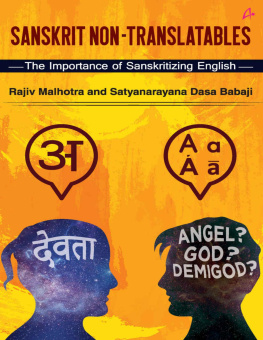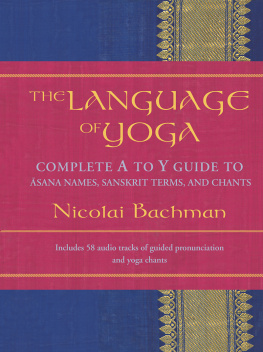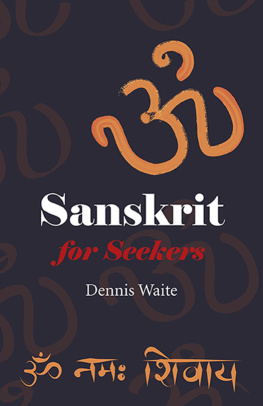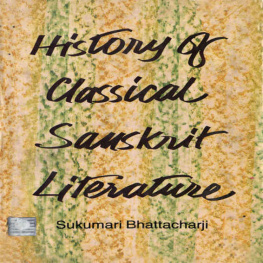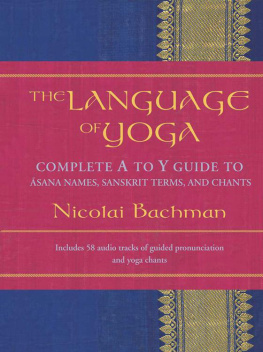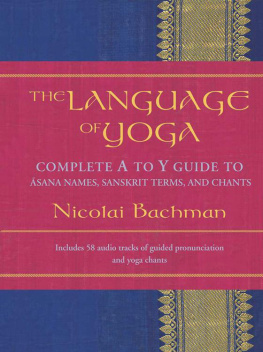Malhotra - The battle for Sanskrit : is Sanskrit political or sacred, opressive or liberating, dead or alive?
Here you can read online Malhotra - The battle for Sanskrit : is Sanskrit political or sacred, opressive or liberating, dead or alive? full text of the book (entire story) in english for free. Download pdf and epub, get meaning, cover and reviews about this ebook. City: Array, year: 2016, publisher: HarperCollins Publishers India, genre: Religion. Description of the work, (preface) as well as reviews are available. Best literature library LitArk.com created for fans of good reading and offers a wide selection of genres:
Romance novel
Science fiction
Adventure
Detective
Science
History
Home and family
Prose
Art
Politics
Computer
Non-fiction
Religion
Business
Children
Humor
Choose a favorite category and find really read worthwhile books. Enjoy immersion in the world of imagination, feel the emotions of the characters or learn something new for yourself, make an fascinating discovery.
The battle for Sanskrit : is Sanskrit political or sacred, opressive or liberating, dead or alive?: summary, description and annotation
We offer to read an annotation, description, summary or preface (depends on what the author of the book "The battle for Sanskrit : is Sanskrit political or sacred, opressive or liberating, dead or alive?" wrote himself). If you haven't found the necessary information about the book — write in the comments, we will try to find it.
Malhotra: author's other books
Who wrote The battle for Sanskrit : is Sanskrit political or sacred, opressive or liberating, dead or alive?? Find out the surname, the name of the author of the book and a list of all author's works by series.
The battle for Sanskrit : is Sanskrit political or sacred, opressive or liberating, dead or alive? — read online for free the complete book (whole text) full work
Below is the text of the book, divided by pages. System saving the place of the last page read, allows you to conveniently read the book "The battle for Sanskrit : is Sanskrit political or sacred, opressive or liberating, dead or alive?" online for free, without having to search again every time where you left off. Put a bookmark, and you can go to the page where you finished reading at any time.
Font size:
Interval:
Bookmark:

THE BATTLE FOR
SANSKRIT
Is Sanskrit political or sacred, oppressive or liberating, dead or alive?
Rajiv Malhotra

HarperCollins Publishers India
Dedicated to our purva-paksha and uttara-paksha debating tradition. With gratitude to the purva-pakshins (opponents) I have learned from.
May we engage in this intellectual yajna with mutual respect.

Contents

Introduction:
The Story Behind the Book
T here is a new awakening in India that is challenging the ongoing westernization of the discourse about India and the intellectual machinery that produces it. Serious readers, regardless of their ideological affiliations, would benefit from open and honest discussions between experts on opposite sides. Rather than having two separate monologues, it is better to bring together both sides of such encounters into dignified conversations with mutual respect. However, any such conversation requires each side to be well informed about the other. Unfortunately, this is often not the case today on several key topics.
Although the westernized side has systematically studied the traditional Indian sides texts and practices, the reverse has not been the case: traditional Indian experts using their own categories and frameworks have not adequately studied the scholarship being produced by Western and westernized Indian scholars. My work is a humble attempt to fill this knowledge gap in the traditional camp. In each book, I take up a specific important topic with the hope of informing the traditional scholars so they can participate in the discourse as equals.
This book seeks to wake up traditional scholars of Sanskrit and sanskriti (Indian civilization) concerning an important school of thought that has its base in the US and has started to dominate the discourse on the cultural, social and political aspects of India. This academic field is called Indology or Sanskrit studies (or more broadly, South Asian studies). From their analysis of the past, the scholars of this field are intervening in modern Indian society with the explicitly stated view of detoxifying it of poisons allegedly built into Sanskrit and its texts. Often, they interpret India in ways that the traditional Indian experts would outright reject or at least question. I will start with the episode that intensified my monitoring of this field and led to this book.
In August 2014, I suddenly became aware of an unprecedented threat to the integrity of the Sringeri Sharada Peetham (started by Adi Shankara in the eighth century CE), one of the most sacred institutions for Hindus. (Peetham in Sanskrit signifies seat. In this case it is a high seat which the Shankaracharya occupies to perform the duties, responsibilities and rights for protecting the tradition represented by the peetham.) There was a serious risk of a profound and systematic distortion of the teachings and mission of the peetham, as well as a distortion of sanatana dharma more broadly. I immediately stopped all my other work to investigate this and intervene. From that moment onwards, my energies have been channelled into dealing with this urgent matter.
I will begin with a brief account of how this extraordinary peetham began, and then summarize the dramatic events that unfolded starting about a year ago to potentially undermine it. This book is an outgrowth of those events. The crisis it addresses is much broader and deeper than the implications for one institution; it is a crisis that threatens to undermine the foundations of authority more broadly in Hindu dharma.
The Sringeri Sharada Peetham (often abbreviated as Sringeri Peetham) is one of the oldest centres of learning in Vedanta and considered one of the most important institutions in Hinduism. Adi Shankara, the renowned sage, walked across India to revive sanatana dharma. He debated and defeated the competing philosophies that dominated the discourse at the time.
According to traditional accounts, one of his most significant debates was with Mandana Misra, a prominent scholar in Purva-mimamsa philosophy, a philosophy that emphasizes a ritualistic and literal interpretation of the Vedas. Mandana Misra graciously requested that Shankara pick the judge for the debate as Shankara was much younger and Misra wanted to make the terms of the exchange as equitable as possible. Shankara chose Mandana Misras wife, Ubhaya Bharati, as the judge, because she was known to be intellectually very sharp. She was equal to her husband in all aspects and Shankara knew she would be impartial.
The debate was held over eight days. Finally, Mandana Misra conceded defeat and Ubhaya Bharati showed her true form as Devi Saraswati, and her mortal body disappeared.
At Sringeri, Shankara invoked Devi Saraswati to manifest as Sharadamba. This is how Sri Sharada Devi, a manifestation of Saraswati, the Goddess of Wisdom, became the presiding deity of that institution. Hence its name Sharada Peetham. Shankara then appointed Mandana Misra renamed Sri Sureshwaracharya as the first acharya of the Sringeri Sharada Peetham. This lineage has remained unbroken to this day.
Over the years, due to the presence of Sharada Devi and the erudition of its acharyas, Sringeri became famous as a centre of spiritual power and traditional learning. Many century later, the famed and powerful Vijayanagara Empire was founded under the guidance of the twelfth acharya of Sringeri, Jagadguru Sri Vidyaranya.
Such is the illustrious lineage and prestige of the Sringeri Peetham. There is no Vatican or Pope in Hinduism, owing to its decentralized nature. However, Sringeri is one of a handful of institutions that has comparable importance, being an unimpeachable body of learning and austerity. It is therefore critical that the integrity and credibility of Sringeri remain uncompromised.
Unfortunately, as the events I am about to disclose will show, Sringeri now runs the risk of potentially losing its integrity, all because of some short-sighted choices under consideration by some of its administrators in the USA and India. If their plans were to succeed, Sringeri would find itself in the ruinous position of having relinquished the name and legacy of its founder, Adi Shankara, and of perverting the values of erudition that are its hallmark. Most shamefully of all, such a move would place Shankaras legacy in the hands of the very same forces that have published volumes of academic writings undermining the sanatana dharma tradition.
In each of my previous books, I have taken on the leaders of specific schools of thought that are in effect undermining Hinduism, in terms of its true history and its principles. Even though such whistle-blowing creates tensions with the individuals and institutions being exposed, I consider it necessary that the public be well informed and that important debates take place openly and transparently.
The US-based academic genre of Sanskrit studies that I critique in the present volume as being a threat to Sringeri Peetham in particular, and Hinduism more broadly, has been on my radar for more than a decade. As early as 2005, at the World Sanskrit Congress in Bangkok, I had raised red flags about the work of its leader, Sheldon Pollock, a prominent American Sanskrit scholar. I described how he placed part of the blame for European racism and Nazism at Sanskrits door. More specifically, he had written extensively claiming that brahmin elitism was a factor in shaping the ideologies of British colonialism and German Nazism, and that social oppressiveness built into Sanskrit had contributed to the legitimation of genocide. Chapter 4 explains this further.
Next pageFont size:
Interval:
Bookmark:
Similar books «The battle for Sanskrit : is Sanskrit political or sacred, opressive or liberating, dead or alive?»
Look at similar books to The battle for Sanskrit : is Sanskrit political or sacred, opressive or liberating, dead or alive?. We have selected literature similar in name and meaning in the hope of providing readers with more options to find new, interesting, not yet read works.
Discussion, reviews of the book The battle for Sanskrit : is Sanskrit political or sacred, opressive or liberating, dead or alive? and just readers' own opinions. Leave your comments, write what you think about the work, its meaning or the main characters. Specify what exactly you liked and what you didn't like, and why you think so.

